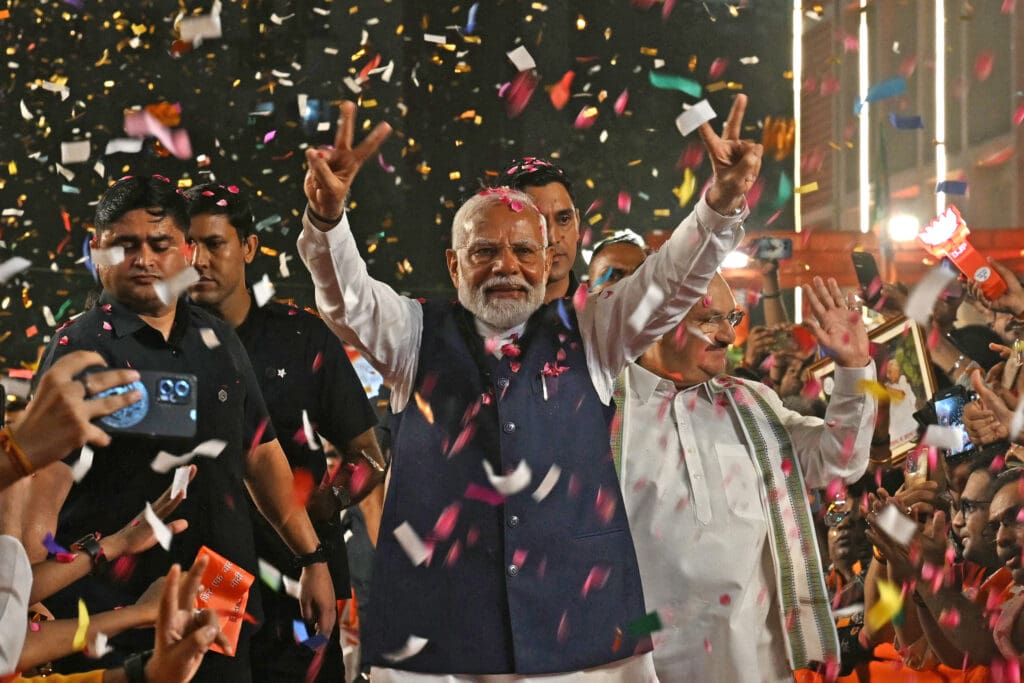India’s recent election was a 44-day “festival of democracy” that targeted 900 million eligible voters in the world’s largest democratic exercise to date. Over 640 million ballots were submitted, including nearly half by women, recording a 66% turnout through 1.1 million polling booths and 5.5 million electronic voting machines. For comparison, this is more than double the number of voters in the European Parliament.
After the results were announced on June 4, a meme that encapsulated the outcome went viral on social media, quipping that the electorate has given the ruling alliance “a victory that feels like a defeat” and the opposition alliance “a defeat that feels like a victory!”
Contrary to pre-poll and exit poll results, which predicted a huge win for the ruling party and its alliance led by Prime Minister Narendra Modi, the final results yielded a surprise. The ruling coalition won only 293 seats, down from 360 in 2019. The opposition bloc made major gains, securing 232 seats compared to 119 in the previous election. As a result of not winning an outright majority, Modi begins his third consecutive term—only the second prime minister to achieve this after Jawaharlal Nehru—at the helm of a coalition government, a first for him in the 23 years of his public life. While the results constitute a major shakeup for Indian politics, the country’s foreign policy, and its burgeoning relations in the Middle East in particular, are unlikely to be affected in any meaningful way.
Over his two terms as prime minister, Modi has visited all the countries on either side of the Gulf, except Kuwait, at least once. He has visited the United Arab Emirates seven times, the last in February 2024, after no Indian premier made the trip for more than three decades. Modi also visited Palestine and Israel, the first by an Indian premier, indicating that India has “de-hyphenated” its ties with both. As long as he remains at the helm, expanding ties in the region will remain a priority for Indian foreign policy.
Yet at 73 years old, Modi’s ability to accommodate the interests of alliance partners will be tested, as he is forced to compromise his own centralized leadership style and the core interests of his party, the Bharatiya Janata Party (BJP). The most likely outcome of the coalition government could be a tempered pro-Hindu or anti-Muslim agenda, which some of the partners are likely to prefer either due to their Muslim support base or to reflect the mood of the country’s majority.
It appears that a considerable part of the electorate was no longer swayed by the BJP’s divisive sectarian politics over the past decade, including heightened communal tensions, a constitutional change that ended the special status for Kashmir, and the recently passed Citizenship Amendment Act that bars Muslim immigrants from getting citizenship. This was particularly evident in the parliamentary constituency that includes Ayodhya, where the BJP lost despite opening the controversial Ram Temple earlier this year built on the site of a demolished mosque—an emotive issue that had galvanized Hindu support for decades.
Nevertheless, the BJP still won 240 seats on the back of Modi’s credibility and the lack of a viable alternative leader. This comes in contrast to the Congress party winning only 99 seats under the stewardship of Rahul Gandhi. Other reasons for Modi’s party’s narrower margin of victory could be attributed to livelihood issues, voter fatigue about one-party domination, and a more unified opposition strategy. Lastly, the government was also a victim of an alarmist opposition narrative that a strong mandate for the BJP would lead to constitutional amendments, hurting the affirmative policies enshrined for the benefit of the marginalized sections of society.
Moving forward, it is likely that economic reforms and the development agenda will receive even greater attention. These policy areas were a mainstay of Modi’s well-crafted, populist welfarism and partly facilitated his party’s return to power. The government would be keen to ensure that India continues to be the world’s fastest-growing economy and rises to be the third largest—after the United States and China—sooner rather than later, preferably before the 2029 elections so that the growth dividend positively impacts the BJP’s future political fortunes.
All of this feeds into India’s foreign policy priorities in the new government and its prioritization of India-Mideast relations under Modi. Indeed, during his tenure, the GCC has emerged as India’s largest regional-bloc trading partner, comprising 15.8% of the country’s total. That compares with only 11.6% for the entire European Union. At the same time, India is importing an ever-increasing amount of energy resources from the region, and Gulf countries are investing heavily in India’s downstream oil and gas sector.
While some analysts assumed that the BJP’s ultra-Hindu nationalism and anti-Muslim policies at home would negatively impact India’s relations in the region, that has not happened. On the whole, this relationship has remained non-ideological and its expansion has constituted Modi’s greatest foreign policy success.
In fact, India’s longstanding pursuit of an “independent” foreign policy and strategic autonomy—balancing between various competitive powers like the U.S. and Russia, Israel and Palestine, Iran and the GCC—syncs well with the Gulf region’s new multi-networked strategy.
As a result, several “minilateral” diplomatic initiatives like the I2U2 group (India, Israel, UAE, U.S.), the India-UAE-France trilateral partnership focusing on renewable energy, technology, and maritime security, and the India-Middle East-Europe-Economic Corridor (IMEEC) were made possible; as was New Delhi’s recent 10-year deal with Tehran to operate the Chabahar Port despite objections from Washington. These policies are likely to stay the course given India’s economic interests, offering opportunities for the Gulf region to find innovative ways of furthering their new penchant for economic diplomacy and de-escalation.
That does not mean strategic autonomy is without challenges, however. Since October 7 and the start of Israel’s assault on Gaza, there has been some concern about the viability of IMEEC. Nonetheless, India has stressed that this connectivity project is for the long term. “While short-term glitches can cause concerns,” Finance Minister Nirmala Sitharaman said in mid-October, “we will keep engaging with all stakeholders. This is just not for the immediate future.” Reflecting this sentiment, an Indian delegation held talks in the UAE in May to empower the strategic project.
Military collaborations involving Middle East countries, such as the recent India-UAE-France joint naval and air exercises, should also remain unaffected as long as Modi’s coalition partners focus on domestic issues and do not interfere in foreign affairs, as is the most likely outcome. One positive indicator of continuity is the retention of Subrahmanyam Jaishankar as India’s minister of external affairs.
While it is unlikely that there will be any dramatic changes in India’s foreign and security policies, Modi may use his third—and perhaps last—term to attempt re-engagements with Pakistan and, especially, China, thus leaving behind a more comprehensive foreign policy legacy before he passes on the mantle to another leader.
Overall, the election results and a mellowed Modi 3.0 could be construed as a victory for Indian democracy, secularism, federalism, and growth, which is also good for the Gulf region and the world at large.


